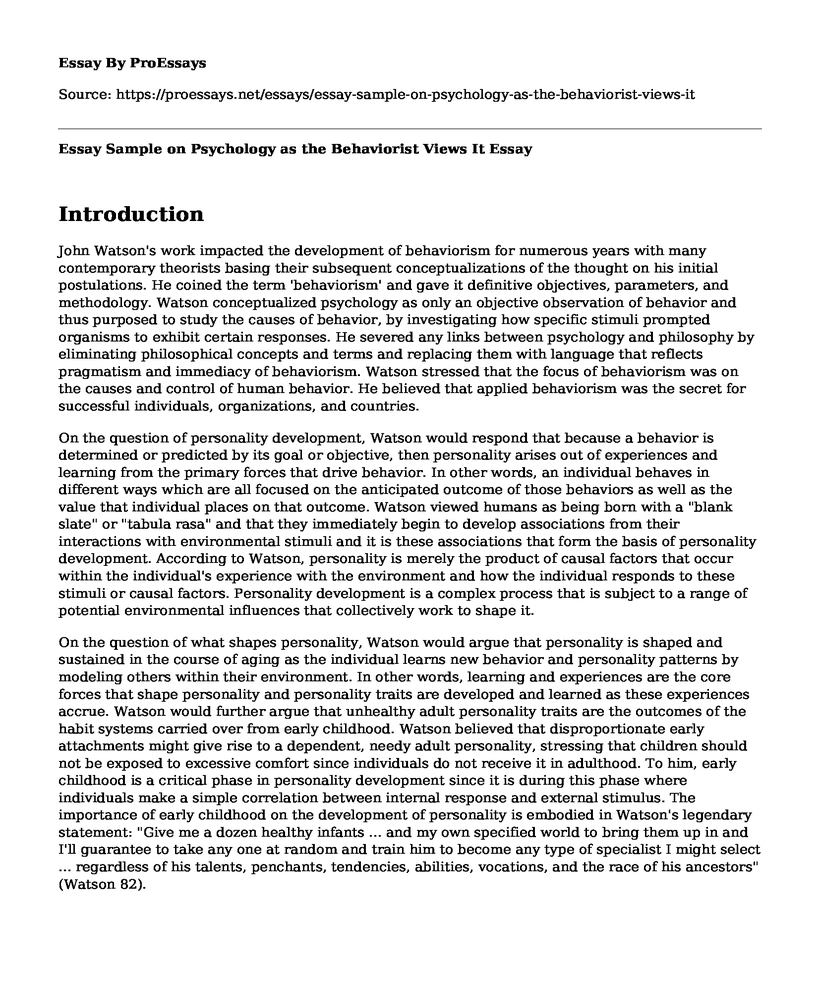Introduction
John Watson's work impacted the development of behaviorism for numerous years with many contemporary theorists basing their subsequent conceptualizations of the thought on his initial postulations. He coined the term 'behaviorism' and gave it definitive objectives, parameters, and methodology. Watson conceptualized psychology as only an objective observation of behavior and thus purposed to study the causes of behavior, by investigating how specific stimuli prompted organisms to exhibit certain responses. He severed any links between psychology and philosophy by eliminating philosophical concepts and terms and replacing them with language that reflects pragmatism and immediacy of behaviorism. Watson stressed that the focus of behaviorism was on the causes and control of human behavior. He believed that applied behaviorism was the secret for successful individuals, organizations, and countries.
On the question of personality development, Watson would respond that because a behavior is determined or predicted by its goal or objective, then personality arises out of experiences and learning from the primary forces that drive behavior. In other words, an individual behaves in different ways which are all focused on the anticipated outcome of those behaviors as well as the value that individual places on that outcome. Watson viewed humans as being born with a "blank slate" or "tabula rasa" and that they immediately begin to develop associations from their interactions with environmental stimuli and it is these associations that form the basis of personality development. According to Watson, personality is merely the product of causal factors that occur within the individual's experience with the environment and how the individual responds to these stimuli or causal factors. Personality development is a complex process that is subject to a range of potential environmental influences that collectively work to shape it.
On the question of what shapes personality, Watson would argue that personality is shaped and sustained in the course of aging as the individual learns new behavior and personality patterns by modeling others within their environment. In other words, learning and experiences are the core forces that shape personality and personality traits are developed and learned as these experiences accrue. Watson would further argue that unhealthy adult personality traits are the outcomes of the habit systems carried over from early childhood. Watson believed that disproportionate early attachments might give rise to a dependent, needy adult personality, stressing that children should not be exposed to excessive comfort since individuals do not receive it in adulthood. To him, early childhood is a critical phase in personality development since it is during this phase where individuals make a simple correlation between internal response and external stimulus. The importance of early childhood on the development of personality is embodied in Watson's legendary statement: "Give me a dozen healthy infants ... and my own specified world to bring them up in and I'll guarantee to take any one at random and train him to become any type of specialist I might select ... regardless of his talents, penchants, tendencies, abilities, vocations, and the race of his ancestors" (Watson 82).
Conclusion
In summary, John Watson is credited with developing the theory of behaviorism. According to his arguments, personality can be understood as the sum product of an individual's experiences with their environment. Watson's avers that personality is shaped by the individual's learning and experiences throughout the life course and the accumulation of these experiences.
Works Cited
Watson, John B. Behaviorism. Transaction Publishers, 1998.
Cite this page
Essay Sample on Psychology as the Behaviorist Views It. (2022, Aug 15). Retrieved from https://proessays.net/essays/essay-sample-on-psychology-as-the-behaviorist-views-it
If you are the original author of this essay and no longer wish to have it published on the ProEssays website, please click below to request its removal:
- Schizophrenia Research Paper
- Case Study With Multicultural Child: The Relational Theory and Existential Therapy
- Essay Sample on Role of Nurses in the Recovery Process of PTSD Patients
- Research Paper on Association Between Vaccines and Autism
- Research Paper on Physical and Cognitive Development in Early Childhood
- Research Paper on Mental Health Challenges: 80% Affected by Social, Emotional Factors
- Paper Example on Behavioral Corporate Finance: Implications, Value-Based Mgmt & Psychology







